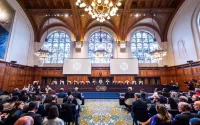4 March 2006Gush Shalom
If You want to understand the policy of a country, look at the map!" advised Napoleon. What he meant was: Regimes come and go, rulers rise and fall, ideologies flourish and wither, but geography stands forever. It's geography that decides the basic interest of every state.Vladimir Putin, heir of Czars and Commissars, looked at the map. Looked and picked up the telephone to invite the Hamas leaders.
A HUNDRED years ago, the whole expanse from India to Turkey was a battlefield between Russia and the main Western power at that time - the British Empire. Adventurers, spies, diplomats and plotters of all stripes roamed the area. This contest was known as "The Great Game".
In time, the actors changed. The Bolsheviks took the place of the Czars, the American Empire succeeded the British. But the Great Game went on.
When the Soviet Union collapsed, it seemed as if the game had come to an end. Russian influence disappeared from the region. The Soviet empire dissolved, and what remained was too weak, too poor, to take part in the game. It had no jetons.
And now, with one stroke, Putin has changed everything. Inviting Hamas to Moscow was a gambit of genius: it didn't cost anything, and it put Russia back on the map of the Middle East. While the whole world was still puzzled and confused by the Hamas victory, Putin used the sharp scalpel of unemotional logic and made the first move of a new game.
This way, the new Czar of all the Russias exploited the weakness of his rivals. President Bush has got himself into a dismal position. When all the other pretexts for his bloody Iraqi adventure had evaporated into thin air, he raised a new flag: democracy in the Middle East. He imposed new elections on the Palestinians. In these elections, the most democratic one could imagine, the winner was - alas! - Hamas.
What to do? To declare that democratic elections are good only if they deliver the outcome we desire? To boycott the Palestinian authority, now the "Second Democracy in the Middle East"? To starve the Palestinians until they elect the "right" leadership?
Bush could, of course, recognize the elected Hamas government. But how could he do that? After all, the United States has put Hamas on its list of terrorist organizations - not only its military wing, but the whole movement, including the kindergartens and mosques. Now they are caught up in the Clash of Civilizations, the apocalyptic battle between the West and Islam.
Nothing to be done. America is a chess-player caught in a position of stalemate - unable to make any move at all.
Europe is in a similar situation. Like a mental patient in a straitjacket, it cannot move its arms. It put on this jacket itself. Under American and Israeli pressure, it put Hamas on its terror list, and thus condemned itself to total impotence in the new situation.
Putin does not laugh often. But now, perhaps, he may be permitting himself a thin smile.
THE PALESTINIANS, too, are quite confused. In these elections they surprised themselves, and, no less, Hamas.
Inside Fatah, there are contradictory views about what to do. The good of the Palestinian people clearly demands a wide coalition, which would include all parties, in order to overcome the crisis and prevent a boycott of the Palestinian Authority by the world. But the narrow party interest of Fatah says otherwise: Let's compel Hamas to govern alone. It will break its head, the world will boycott it. After a year or two, the Palestinian public will return Fatah to power.
That's Realpolitik, but dangerous. During the one or two years, the Israeli government will enlarge the settlements, build more and more of the Wall, fix new borders, annex the Jordan valley - the sky is the limit. The reaction of the Palestinian public may be quite different from what the Fatah people imagine.
Hamas is also baffled. It knows full well that the elections were less an ideological breakthrough than a protest vote - more against Fatah than for Hamas. Now Hamas must gain the heart of the Palestinian people, and the people want an end to the occupation, and peace at last.
Hamas does not want the world to ostracize the Palestinian Authority and starve the population. But it cannot change its skin on the morrow of its victory. What will the Palestinians say if it suddenly declares that it is ready to recognize Israel's right to exist, to disarm and annul its charter? That it has sold its soul to Satan in order to enjoy the comforts of power? That it is as corrupt as Fatah?
If Israel and America wanted to lead Hamas towards a path of peace, they would ease its way towards the desired change. They could find mechanisms for the transfer of the money due to the Palestinians. They could be satisfied with an announcement that the new government is based on the Oslo Agreement (which includes the recognition of Israel) without demanding that Hamas humiliate itself in public. They could agree to a Hudna (armistice) for the transition period and put an end to all violent action by both sides. Hamas can be disarmed by including its fighters in the official security forces. And, of course, and most importantly - prisoners could be released.
But the present Israeli government shows no interest in making it easy for Hamas. And if the Israeli government is not interested, what American politician, if not bent on suicide, can say otherwise?
IN ISRAEL, the Hamas victory has not given rise to sorrow and lamentations. On the contrary. Israeli leaders could hardly hold back from dancing in the streets.
At long last, it has become perfectly clear that "There is No One to Talk With". If Yasser Arafat was no partner, and if Mahmoud Abbas was no partner, Hamas is the mother of all no-partners. Nobody can rebuke us for going on with "targeted killings", destroying the Palestinian economy, building walls, breaking up the West Bank territory, cutting off the Jordan valley and generally doing whatever we feel like. And if, with God's help, Palestinian terrorism starts again, we can say to everybody: "We told you so!"
But in Israel, too, there is a lot of confusion. Under American pressure, Ehud Olmert was compelled to transfer to the Palestinian at least once the revenues that Israel has collected on their behalf. He was immediately attacked for "surrendering" to Hamas. Even this small act of surrendering stolen money has caused a political storm. The Israeli election, due to take place in 24 days, casts its shadow on everything.
Now comes Putin's daring step. He makes it easier for the Hamas leadership to moderate its stance - if it is ready to join the political game. He also makes it easier for the government of Israel - if the government of Israel wants dialogue and peace. And, above all else, he is announcing that Russia is back in the Great Game.






